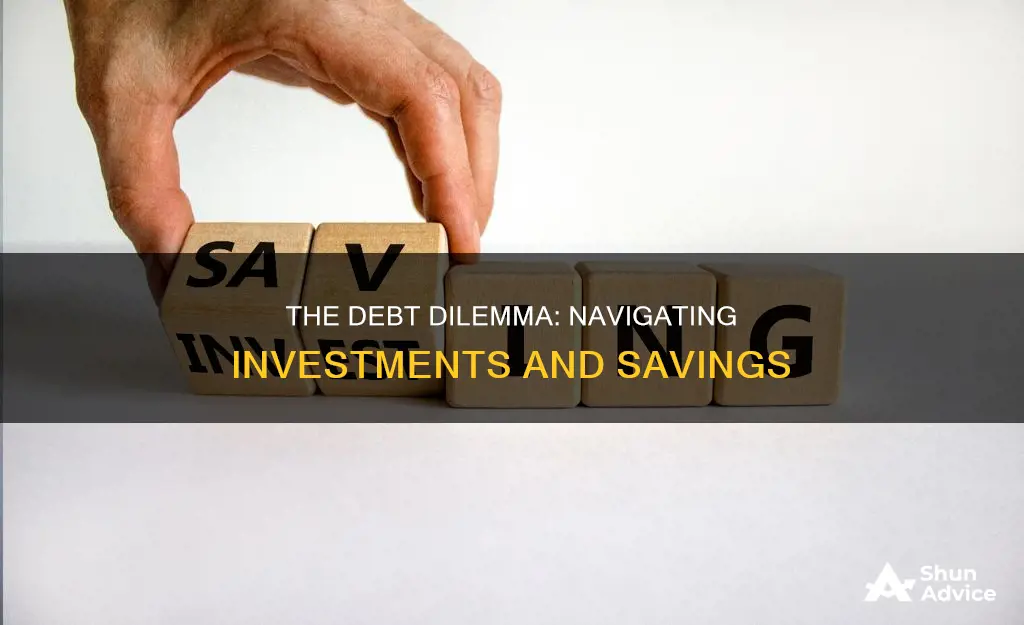
Deciding whether to save, invest, or pay off debt is a common financial dilemma. While there is no one-size-fits-all solution, there are several factors to consider when making this decision. Firstly, assess your budget and spending to understand your income, expenses, and debt obligations. Then, consider the interest rates on your debts and compare them to potential investment returns. If you have high-interest debt, such as credit card balances, focus on repaying it first to reduce costs and improve your credit score. Additionally, ensure you have an emergency fund to cover unexpected expenses, and take advantage of any employer retirement plan matches, as they offer free money and tax benefits. Finally, strike a balance between saving, investing, and debt repayment to achieve financial stability and work towards your financial goals.
| Characteristics | Values |
|---|---|
| Interest rate on debt | If the interest rate on your debt is 6% or greater, you should generally pay off the debt before investing. |
| Return on investment | If your portfolio's return on investment is higher than the cost of financing debt, it makes sense to invest while making minimum debt payments. |
| Emergency fund | It's good to have an emergency fund of 3-6 months' worth of expenses. |
| Retirement plan | Don't skip your company's retirement plan matches. |
| Credit score | A low credit score can impact your ability to finance large purchases and get out of debt. |
| Risk tolerance | If you're comfortable taking the gamble that your investments will fluctuate with the markets, you're a better candidate for investing than someone who would worry about market fluctuations. |
What You'll Learn
- Compare the interest rate on your debt with the return you expect to earn on your investments
- If you have high-interest credit card debt, it makes sense to pay that off before saving or investing
- If you have no savings, an emergency expense could cause you to put the charge on your credit card, resulting in a high-interest payment
- If you have a low credit score, it can be difficult to get a loan with a low-interest rate
- If your debt is causing you significant stress or anxiety, you may want to prioritise paying it off

Compare the interest rate on your debt with the return you expect to earn on your investments
When deciding whether to invest or pay off debt, it is important to compare the interest rate on your debt with the expected return on your investments. This is because the interest rate on your debt represents the cost of borrowing, while the expected return on your investments represents the potential profit. By comparing these two rates, you can make an informed decision about where to allocate your money.
The general rule of thumb is that if the interest rate on your debt is higher than the expected return on your investments, you should prioritize paying off the debt. This is because you are effectively losing more money by paying interest on the debt than you are gaining by investing. For example, if you have credit card debt with a 20% interest rate, it is usually better to pay off that debt before investing in a stock market index fund with a 10% return.
On the other hand, if the expected return on your investments is higher than the interest rate on your debt, investing may be the better option. This is because you can potentially earn more money by investing than you would save by paying off the debt early. For instance, if you have a mortgage with a 5% interest rate and an investment opportunity with a projected 10% return, investing your money may be the wiser choice.
It is important to note that this decision involves more than just numbers. Your risk tolerance and personal financial goals also play a crucial role. Some people may prefer the peace of mind that comes with being debt-free, even if the numbers suggest investing would be more profitable. Others may be comfortable taking on more risk by investing, despite having debt.
Additionally, the type of debt and investment opportunities should be considered. Credit card debt, for example, typically carries high-interest rates and should often be prioritized for repayment. Meanwhile, certain types of debt, such as student loans or mortgages, may offer tax incentives that could impact your decision.
In conclusion, when deciding between investing and paying off debt, comparing the interest rate on your debt and the expected return on your investments is a crucial step. However, it is also important to consider your financial goals, risk tolerance, and the specific characteristics of your debt and investment opportunities.
Funding LLC Investors
You may want to see also

If you have high-interest credit card debt, it makes sense to pay that off before saving or investing
It is generally recommended to pay off high-interest credit card debt before saving or investing. Credit card debt can have high interest rates, often upwards of 20%, and these rates are usually much higher than the returns you would get by investing your money. For example, the average credit card interest rate is 22.40%, according to LendingTree, while the average return of the stock market over the last five years was 10.92%.
By tackling high-interest credit card debt first, you could save hundreds or even thousands of dollars in interest. This may also free up cash to add to your emergency fund or kickstart your investing plan.
Before investing, it is also important to have at least a small emergency fund for unexpected expenses, such as car repairs or medical bills. Aim for a long-term goal of three to six months' worth of expenses.
Additionally, if your employer offers a retirement plan with matching contributions, it is recommended to take advantage of this before investing elsewhere. This is essentially free money, and it would be unwise to pass up on this benefit.
In summary, while everyone's financial situation is different, it is generally advisable to pay off high-interest credit card debt before saving or investing. This can reduce the total interest you pay over time and free up cash flow for other financial goals.
Gladstone Investment: Unlocking Monthly Dividend Potential
You may want to see also

If you have no savings, an emergency expense could cause you to put the charge on your credit card, resulting in a high-interest payment
It is always a good idea to have some money set aside for emergencies. If you have no savings, an unexpected expense could cause you to put the charge on your credit card, resulting in a high-interest payment. This could be a sudden car repair bill or medical bill. Having a few thousand dollars in an easy-access savings account for emergencies might help you sleep better at night.
Financial experts recommend building an emergency fund of three to six months' worth of expenses and stashing it in a high-yield savings account. Some even recommend putting enough cash in the bank to be able to pay your expenses for an entire year. This will ensure that you are prepared for any unexpected costs and do not have to resort to high-interest credit card debt.
If you are unsure about whether to invest or save, it is a good idea to consult a financial professional. They can help you understand your specific situation and develop a plan that is tailored to your financial goals.
Is it wise to invest now?
You may want to see also

If you have a low credit score, it can be difficult to get a loan with a low-interest rate
If you have a low credit score, it can be difficult to get a loan, and even if you do, it will likely be at a high interest rate. A low credit score will keep you from getting the lowest APR (annual percentage rate) and will limit your loan amount and repayment term choices.
Lenders consider it riskier to lend to borrowers with bad credit because there may be a higher chance they won't be able to repay the loan. As a result, poor-credit borrowers often have to pay higher APRs than those with good or excellent credit.
The minimum credit score for bad credit may be as high as 670 at some lenders. However, some lenders offer secured loans, which require collateral such as a car or home, and are therefore easier to obtain than unsecured loans.
If you have a low credit score, it's important to compare multiple lenders and loan options, as interest rates and fees can vary significantly. It's also worth considering alternatives to personal loans, such as credit unions or co-signed loans, which may offer lower rates or more flexible requirements.
Delinquent Utilities: Invest Wisely in Others' Defaults
You may want to see also

If your debt is causing you significant stress or anxiety, you may want to prioritise paying it off
Debt can be a significant source of stress and anxiety, and it's important to address it to improve your psychological well-being. If you're losing sleep over your debts, it's crucial to prioritise paying them off as soon as possible. Here are some strategies to help you tackle your debt and reduce the associated stress:
- Create a budget: Start by tracking your income and expenses. Understand your monthly earnings and where your money is going. This will help you allocate funds effectively and identify areas where you can cut back on spending.
- Prioritise high-interest debt: Focus on paying off debts with the highest interest rates first. Credit card debt, for example, typically carries high-interest rates that can quickly accumulate. Transferring your balance to a 0% APR credit card or opting for a low-interest debt consolidation loan can help make repayment more manageable.
- Restructure your debt: Consider debt restructuring options such as balance transfers to lower-interest credit cards or opting for a debt consolidation loan. This can help reduce the overall interest you pay and make your monthly payments more manageable.
- Set up an emergency fund: While paying off debt is important, it's also crucial to have some savings set aside for unexpected expenses. Aim to save at least $1,000 for unplanned costs like car repairs, and gradually work towards saving three to six months' worth of living expenses. This will help you avoid relying on high-interest credit cards when emergencies arise.
- Address the emotional burden: Recognise the emotional toll that debt can take on your life. Seek support from a financial professional or counsellor if needed. They can help you develop a plan to tackle your debt and improve your overall psychological well-being.
- Boost your credit score: Work on improving your credit score by reducing your credit utilisation rate. Pay down debt to lower your credit utilisation, which is a significant factor in determining your credit score. This will not only improve your financial standing but also enhance your ability to access less expensive lines of credit in the future.
- Consider debt consolidation: If you have multiple high-interest debts, debt consolidation may be a viable option. Combining them into a single new loan can help you secure a lower interest rate and simplify your repayment process by consolidating multiple payments into one.
- Seek professional advice: Consult a financial professional to get personalised advice based on your specific situation. They can help you understand your options and develop a comprehensive plan to address your debt and improve your financial well-being.
Eth Investment: Right Move Now?
You may want to see also
Frequently asked questions
It depends on the type of debt you have. If you have high-interest credit card debt, it is recommended to pay this off first before investing. However, if your debt has a low-interest rate, such as a car loan, government student loan, or mortgage, it may be more beneficial to continue making regular payments and focus on investing.
It is recommended to have an emergency fund of at least $1,000 for unexpected costs, such as car repairs. Ideally, you should aim to save three to six months' worth of living expenses.
Paying off debt can improve your credit score, which will make it easier to secure loans in the future and may result in lower interest rates. It can also reduce stress and anxiety associated with debt.
Investing can generate passive income, which can be used to pay off debt while growing your investment portfolio. Investing in a tax-advantaged retirement account can also lower your taxable income.







